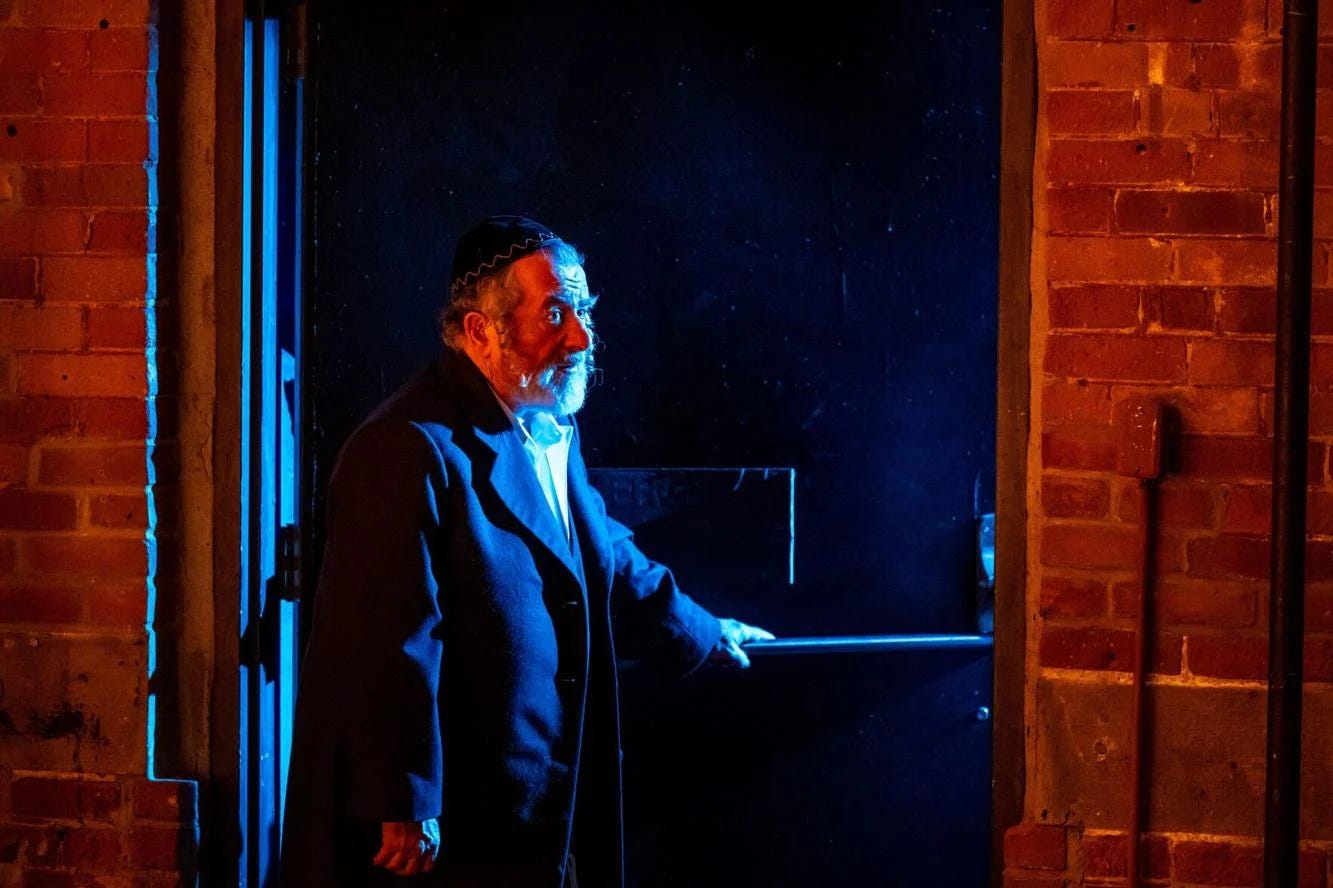Playing Shylock is adapted by Mark Leiren-Youngfrom the 1966 play ‘Shylock’and incorporates an array of contemporary references to bring it up to date. What is slightly more interesting and concerning is, of course, how little the core of the piece needed updating. What was interesting as ever with such ‘here and now’ works was watching the play in Toronto on the night of the US election (before the results) with a sense of literally, ‘well, this could go either way in the future.’
Of course, we now know which way politics went and have a clue about which way the wider world may swing and all the fear that comes with that. But that is a conversation for future performances of this and many other works. But it was that evening a reminder of where theatre, art, and the commentary it offers to sit in our broader cultural and political conversations.
And this is a confronting, political conversation. But as all good theatre should be, it is also an engaging, personal story of political conversation. Saul Rubinek offers a moving, personal, engaging story of what playing Shylock, Shakespeare’s iconic but also controversial Jew, means to him. At the same time, the play weaves a story of what not just theatre but art is up against. It is, specifically and importantly, a Jewish play about Jewishness, antisemitism, and celebrating Jewishness. But it is also a play about the ‘cancellation’ controversy and what theatre and art are up against.
The review in the Toronto Star describes various art-based controversies and ‘cancellations’ in recent months and years. Again, not to detract from the central Jewishness and Jewish story of Playing Shylock, which is and should be seen as the central message, there is nothing wrong- indeed, it is also essential- to see the broader ramifications of such prejudices, such censorship, such watering down that art is being subject to keep it from being ‘cancelled’.
It’s complicated, is the answer the play seems to offer. It might read like a cop-out, but it’s true. Rubinek wrestles with the fact that Shylock isn’t a ‘good’ representation of Jewishness. That the character contains,s at best, character elements at wors,t offensive ones. But thatShlyock is also his dream role. For his Jewishness, for the complexity amid caricature. Because- and here is something we often lose in today’s conversations- more than one thing can be true at once. We can acknowledge the character's shortcomings, or even offensiveness on some levels, but also recognise the appeal, the need to play him on others for an actor like Rubinek. He I,s after all, not positing Shylock, the character, as a role model. Still, he also recognises that there is a history, an important legacy, even in that character, that feels vital to an actor like him. And for all his faults as a character, as the play jokes, he’s not the Jew from ‘The Jew of Malta’ who, to quote the play ‘makes Shylock look like Eugene Levy.’
That’s a great Canadian-Jewish joke for you.
And the play is full of them. As much as the subject is heavy, the delivery is light. Rubinek is, after all, a comedic genius. And while he talks with candour about anti-semitism, the Holocaust censorship and all manner of other heavy topics, it is done with authentic humour that is not to appease or make ‘palatable’ the stories- he is still unflinching in the delivery of the severe moments- but it is instead an honest human response to darkness- with dark humour and lightness hidden in it. Humour is, after all, a defence, a weapon and a power against discrimination and silence, and it’s wielded well here.
You must pick a lane with confrontational, potentially controversial art. That’s sometimes shock, sometimes emotion, but sometimes more effectively, it’s humour. Playing Shlyock and Rubinek’s performance delivers and shows the effectiveness of humour- to be as moving, affecting and rousingly political as all the other means combined.
It’s also pleasingly meta, with biographical details not just of Rubinek’s life woven into the script but also the wider Canadian context- the theatre it’s performed in, the origins of Rubinek and director Martin Kinch’s career there, the neighbourhood it’s in (organic tomatoes and all). It gives serious slants of reality to the audience present by reminding them that ‘yes in this neighbourhood’ things get cancelled, the production of ‘Clear Light’ that the play references at that very theatre, was indeed shut down by the morality police. As much as all of it is true, even the parts that aren’t directly reported facts, grounding it in the physical reality of Toronto theatre helps the case further.
More than that too, it is perhaps every theatre graduate's favourite topic (or mine at least) theatrical ghosting. Or as I like to refer to it ‘the Marvin Carlson of it all’ that is (to paraphrase many a Masters essay) the lingering ‘ghosts’ of productions past, the emotions they elicited, being present for every production thereafter. For example, if you saw a play that moved you so much, in a particular theatre, you’d remember it every other time you went there. It’s a bigger version of that; every theatre space is ‘haunted’ by every production that goes before it…this play references that (meta again) but also feels all the more powerful with that context in mind. Playing Shylock stands on the shoulders of not only all that went before it in Toronto Free theatre and Canadian Stage on that site…but also on the shoulders of all the Shylocks before. The political statement the piece is making aside, this play is a theatre geek’s dream for the levels to unfurl there.
And that too, along with the humour of the piece, is important; it’s a good piece of theatre. And in a piece that is concerned with the role of theatre and art more broadly, that’s important. Because for the conversations to be provoked by theatre, then we surely need…good theatre. And this is that. As mentioned, it is witty, compelling, and expertly woven in terms of storytelling. Add to that a master narrator of that story, and you have a compelling case for the place of art and the multitudes it contains.
Playing Shylock is at Canadian Stage, Toronto, until December 1st 2024
Tickets and information here.







Thanks for this. Saw it tonight. Really enjoyed it!! Thoughtful, thought provoking… just what theatre should do.